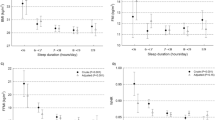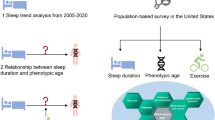Abstract
The objective of this longitudinal, observational study was to verify whether a favorable change in sleep duration over 6 years could impact objective indicators of adiposity in adults aged 18–64 years. Short-duration sleepers (⩽6 h per day; n=43) at baseline were divided into two groups: (i) those who increased their sleep duration to a ‘healthy’ length of 7–8 h per day at year 6 (mean increase: 1.52±0.66 h per day; n=23); and (ii) those who maintained their short sleep duration habits (mean change: −0.11±0.38 h per day; n=20). Adult individuals who reported sleeping 7–8 h per day at both baseline and year 6 (n=173) were used as a control group. Change in adiposity indicators for each sleep-duration group was compared by analysis of covariance. We observed that the two short-sleep-duration groups had similar baseline characteristics. However, short-duration sleepers who maintained their short sleep duration experienced a greater increase in body mass index (BMI) (difference: 1.1±0.36 kg m−2, P<0.05) and fat mass (difference: 2.4±0.64 kg, P<0.05) over the 6-year follow-up period than short-duration sleepers who increased their sleep duration, even after adjustment for relevant covariates. We did not observe any significant difference in adiposity changes between the control group and short-duration sleepers who increased their sleep duration. This study suggests for the first time that shifting sleep duration from a short to a healthier length is associated with an attenuation of fat mass gain.
This is a preview of subscription content, access via your institution
Access options
Subscribe to this journal
Receive 12 print issues and online access
$259.00 per year
only $21.58 per issue
Buy this article
- Purchase on Springer Link
- Instant access to full article PDF
Prices may be subject to local taxes which are calculated during checkout

Similar content being viewed by others
References
Nielsen LS, Danielsen KV, Sørensen TI . Short sleep duration as a possible cause of obesity: critical analysis of the epidemiological evidence. Obes Rev 2011; 12: 78–92.
Chaput JP, Klingenberg L, Sjödin AM . Do all sedentary activities lead to weight gain: sleep does not. Curr Opin Clin Nutr Metab Care 2010; 13: 601–607.
Brondel L, Romer MA, Nougues PM, Touyarou P, Davenne D . Acute partial sleep deprivation increases food intake in healthy men. Am J Clin Nutr 2010; 91: 1550–1559.
Spiegel K, Tasali E, Leproult R, Van Cauter E . Effects of poor and short sleep on glucose metabolism and obesity risk. Nat Rev Endocrinol 2009; 5: 253–261.
Cizza G, Marincola P, Mattingly M, Williams L, Mitler M, Skarulis M et al. Treatment of obesity with extension of sleep duration: a randomized, prospective, controlled trial. Clin Trials 2010; 7: 274–285.
Bouchard C . Genetic epidemiology, association and sib-pair linkage: results from the Quebec Family Study. In: Bray G, Ryan D (eds). Molecular and Genetic Aspects of Obesity. Louisiana State University Press: Baton Rouge, LA, USA, 1996, pp 470–481.
The Airlie (VA) Consensus Conference. In: Lohman T, Roche A, Martorel R (eds). Standardization of Anthropometric Measurements. Human Kinetics: Champaign, IL, USA, 1988, pp 39–80.
Behnke AR, Wilmore JH . Evaluation and regulation of body build and composition. In: Behnke AR (ed.). Evaluation and Regulation of Body Build and Composition. Prentice-Hall: Englewood Cliffs, NJ, USA, 1974, pp 20–37.
Meneely GR, Kaltreider NL . Volume of the lung determined by helium dilution. J Clin Invest 1949; 28: 129–139.
Siri WE . The gross composition of the body. Adv Biol Med Phys 1956; 4: 239–280.
Patel SR . Reduced sleep as an obesity risk factor. Obes Rev 2009; 10 (Suppl 2): 61–68.
Chaput JP, Leblanc C, Pérusse L, Després JP, Bouchard C, Tremblay A . Risk factors for adult overweight and obesity in the Quebec Family Study: have we been barking up the wrong tree? Obesity (Silver Spring) 2009; 17: 1964–1970.
Gangwisch JE . Epidemiological evidence for the links between sleep, circadian rhythms and metabolism. Obes Rev 2009; 10 (Suppl 2): 37–45.
Gallicchio L, Kalesan B . Sleep duration and mortality: a systematic review and meta-analysis. J Sleep Res 2009; 18: 148–158.
Tremblay A, Sévigny J, Leblanc C, Bouchard C . The reproducibility of a three-day dietary record. Nutr Res 1983; 3: 819–830.
Government of Canada. The Canadian Nutrient File. Health and Welfare Canada: Ottawa, Canada, 1990.
Bouchard C, Tremblay A, Leblanc C, Lortie G, Savard R, Thériault G . A method to assess energy expenditure in children and adults. Am J Clin Nutr 1983; 37: 461–467.
Leproult R, Van Cauter E . Role of sleep and sleep loss in hormonal release and metabolism. Endocr Dev 2010; 17: 11–21.
Chaput JP, Klingenberg L, Astrup A, Sjödin AM . Modern sedentary activities promote overconsumption of food in our current obesogenic environment. Obes Rev 2011; 12: e12–e20.
Nedeltcheva AV, Kilkus JM, Imperial J, Schoeller DA, Penev PD . Insufficient sleep undermines dietary efforts to reduce adiposity. Ann Intern Med 2010; 153: 435–441.
Acknowledgements
We express our gratitude to the subjects for their participation in the Quebec Family Study and the staff of the Physical Activity Sciences Laboratory at Laval University for their contribution to this study. We especially thank Dr Germain Thériault, Guy Fournier, Monique Chagnon, Lucie Allard and Claude Leblanc for their help in the collection and analysis of the data. J-PC designed the study, conducted the analyses and wrote the manuscript. CB and AT designed and created the Quebec Family Study and CB, AT and J-PD helped revise the manuscript. We acknowledge the financial support over 20 years of the Medical Research Council of Canada (now the Canadian Institutes of Health Research) through several grants for the Quebec Family Study, as well as other agencies from the governments of Quebec and Canada. J-PC holds a Junior Research Chair in Healthy Active Living and Obesity Research. J-PD is scientific director of the International Chair on Cardiometabolic Risk held at Université Laval. CB is partially supported by the John W Barton Sr Chair in Genetics and Nutrition. AT is partly funded by the Canada Research Chair in Environment and Energy Balance.
Author information
Authors and Affiliations
Corresponding author
Ethics declarations
Competing interests
The authors declare no conflict of interest.
Rights and permissions
About this article
Cite this article
Chaput, JP., Després, JP., Bouchard, C. et al. Longer sleep duration associates with lower adiposity gain in adult short sleepers. Int J Obes 36, 752–756 (2012). https://doi.org/10.1038/ijo.2011.110
Received:
Revised:
Accepted:
Published:
Issue Date:
DOI: https://doi.org/10.1038/ijo.2011.110
Keywords
This article is cited by
-
Substituting device-measured sedentary time with alternative 24-hour movement behaviours: compositional associations with adiposity and cardiometabolic risk in the ORISCAV-LUX 2 study
Diabetology & Metabolic Syndrome (2023)
-
Modifications of 24-h movement behaviors to prevent obesity in retirement: a natural experiment using compositional data analysis
International Journal of Obesity (2023)
-
Combining body mass index with waist circumference to assess coronary microvascular function in patients with non-obstructive coronary artery disease
Journal of Nuclear Cardiology (2022)
-
High sleep variability predicts a blunted weight loss response and short sleep duration a reduced decrease in waist circumference in the PREDIMED-Plus Trial
International Journal of Obesity (2020)
-
Lack of sleep as a contributor to obesity in adolescents: impacts on eating and activity behaviors
International Journal of Behavioral Nutrition and Physical Activity (2016)



